Literary rating: ★★★★★
Kick-butt quotient: ☆
Heather Day Gilbert (who’s also a Goodreads friend, and one of my favorite writers) earned high marks from me with her earlier Vikings of the New World duology. Here, she teams up with a new-to-me fellow evangelical Christian writer, Jen Cudmore, to deliver another solid work of historical fiction (the opening volume in a projected series) set in the same era. My trade paperback ARC of this novel was generously given to me by Heather herself; no commitment that my review would be favorable was asked for or given.
Our setting here is partly in Viking-ruled northern Scotland (“Caithness”), but mostly in Scandinavia –specifically, in Tavland, a fictional large island west of Norway. (A map of the island is provided, but it has no scale and doesn’t show it in relation to any other body of land. I picture it as about midway between Norway and Iceland, and perhaps about the size of the latter.) Novels set in fictional countries aren’t unheard of (The Prisoner of Zenda comes to mind). In this case, I’d guess the reason for the device is that the authors wanted to be able to depict a Viking polity, but not to have to be bound to the historical personalities or events of any of the actual ones. The time frame is mainly 998-999 A.D. (with a short prologue set in 989). This was a time when Christianity was spreading in the northern lands, but far from universal. So polygamy and concubinage are still legal, as is slavery (and sexual exploitation of slaves). Warfare and violence are common, life expectancy can be short, and women are under a yoke of patriarchy –though in some ways it’s not as heavy a yoke as it is in the more “civilized” lands of the south in that day.
We have two co-protagonists and primary viewpoint characters here, both young women. Tavland native Ellisif, born into a land-owning family, is about 26 in 998, mother of two little girls, pregnant again, and trapped in an abusive arranged marriage. Somewhat younger at around 20, Inara was born in slavery in the islands north of Scotland, to a now-dead Tavish mother kidnapped into slavery some years earlier. Tall and strong, tough-minded and blessed with some sword skills (long story!), we meet her on the Scottish mainland hiding out from her former master. (We learn the backstory behind that only gradually.) Her goal is to become a warrior. (Although relatively rare, shield-maidens weren’t unknown in Viking society, and could be accepted as such on their merits.) Circumstances are about to bring these ladies’ life-paths together. Their viewpoints are supplemented by those of two Tavish male characters, both single: young jarl (a Viking noble title, cognate with the English “earl”) Dagar, who as a teen was engaged to Ellisif, before her parents died in a accident and her oldest brother got the bright idea of selling her like a cow or a mare to her present husband, and ship-builder and occasional warrior Hakon.
 As you’ve no doubt already surmised, yes, this novel does have a romantic component –and, indeed, two romances for the price of one. :-) But it offers more than that, as serious writers know that fiction must if it depicts romantic love as a realistic (and good!) part of the totality of human life; and our two authors here are definitely serious writers. We’re looking here at family life, social relationships, implicit questions of social justice and the relationship of Christian faith to conduct; and we’re also getting a crash course (which sadly is as relevant in 2022 as it was in 998!) in the grim realities of spousal abuse and what is or isn’t a helpful way of dealing with it. (The “Word from the Authors” at the end is constructive in that regard.) Questions of gender roles, and the relationship of career goals vs. family life, are also front-and-center here, and again very relevant.
As you’ve no doubt already surmised, yes, this novel does have a romantic component –and, indeed, two romances for the price of one. :-) But it offers more than that, as serious writers know that fiction must if it depicts romantic love as a realistic (and good!) part of the totality of human life; and our two authors here are definitely serious writers. We’re looking here at family life, social relationships, implicit questions of social justice and the relationship of Christian faith to conduct; and we’re also getting a crash course (which sadly is as relevant in 2022 as it was in 998!) in the grim realities of spousal abuse and what is or isn’t a helpful way of dealing with it. (The “Word from the Authors” at the end is constructive in that regard.) Questions of gender roles, and the relationship of career goals vs. family life, are also front-and-center here, and again very relevant.
One thing that quality historical fiction such as this tends to show is that human nature and needs haven’t really changed over the centuries. (In opposition to that idea, it’s often asserted by modern would-be critics, who know little of history, that romantic love was only invented in the 1700s, and was a concept totally unknown and unimaginable before that. Plenty of primary-source evidence exists to belie that claim; it was not only a known concept, but felt by lots of people, then as now. It just wasn’t always as readily taken into account by people making the decisions about marriages then as now –and, as Ellisif and Dagar would tell us, the ones getting married weren’t always the ones making the decision.) And though this is a “romance,” it’s no bodice-ripper.
The quality of the writing here is very good, and the collaboration is seamless; I’ve read and liked several of Heather’s books, but I couldn’t tell any stylistic difference between the various parts of this book to suggest different authorship. Past-tense, third-person narration is used throughout, however, rather than Heather’s characteristic present-tense first person. (I like the one as well as the other, so that was no problem for me.) A textured picture of Viking daily life is presented, clearly based on solid research; but the research isn’t intrusive. Like Norah Lofts, our authors here avoid archaic-sounding diction in their dialogue; there are touches that suggest the setting, but we basically understand that the characters’ Old Norse is translated for us into conventional modern English with an “equivalent effect” (which explains the single use here of “okay” in conversation). References to Christian faith are natural in the circumstances of the story, and not “preachy.” Our Christian characters are Catholics (one minor character is an abbot), but denominational distinctives aren’t much in evidence. (I’d have liked more reference to the development of Inara’s faith, which is actually treated very sketchily.) Directly-described violent action scenes only occur in three places, and aren’t very graphic, but Inara shows her mettle enough to earn her “action heroine” status from me.
As a concluding note, we use “Viking” today as a general term for the ancient and early medieval Nordic inhabitants of Scandinavia, men and women, old and young. In the book, though, it’s used as it was then, as a term for a warrior. (It comes from the verbal form, “to go a-viking,” that is, trading/raiding, as inclination or circumstances dictated, in the lands to the south.) With that understanding, the title has a special meaning that will become apparent by the end of the book. :-)
Authors: Heather Day Gilbert and Jen Cudmore.
Publisher: WoodHaven Press; available through Amazon, both for Kindle and as a printed book.
A version of this review previously appeared on Goodreads.





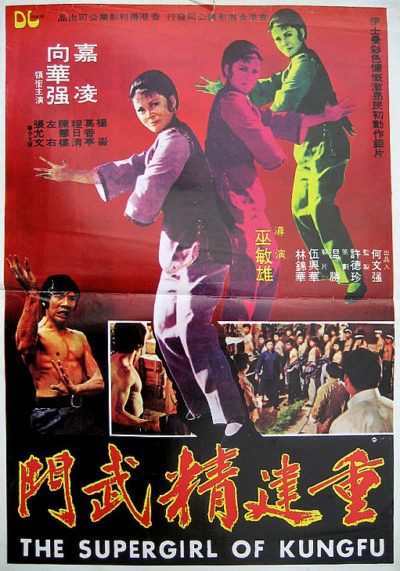 This is another one of an apparently infinite series of kung-fu films, set during the Japanese occupation of China that took place just before World War II. The heroine is Little Flower (Lee), who gets given a death-bed mission by her martial arts master father: return to Shanghai, and lead his students at the Ching Wu Men school against the occupying Japanese forces. Except, on arriving, Flower finds the school disbanded by force, and its disciples scattered to the winds. She begins to hunt the top students, Rock (Yang) and Mercury – the latter has gone particularly deep into hiding after having killed twenty Japanese soldiers in one night. But Flower’s own activities, protecting the poor, bring her to the attention of the Japanese authorities, because they think she’s part of the rebels, as well as a local Chinese cop (Heung).
This is another one of an apparently infinite series of kung-fu films, set during the Japanese occupation of China that took place just before World War II. The heroine is Little Flower (Lee), who gets given a death-bed mission by her martial arts master father: return to Shanghai, and lead his students at the Ching Wu Men school against the occupying Japanese forces. Except, on arriving, Flower finds the school disbanded by force, and its disciples scattered to the winds. She begins to hunt the top students, Rock (Yang) and Mercury – the latter has gone particularly deep into hiding after having killed twenty Japanese soldiers in one night. But Flower’s own activities, protecting the poor, bring her to the attention of the Japanese authorities, because they think she’s part of the rebels, as well as a local Chinese cop (Heung). With the aid of her helicopter pilot sister-in-law, Sofia goes to the rig after an official rescue mission is rejected. Getting Stian out is just the start. For the oblivious authorities now plan to deal with the massive pollution threat by setting it on fire. [Hey, it is called The Burning Sea after all…] And that may not be the end of their problems either. It is relatively restrained on the destruction: despite that title, the inflammable ocean only occupies a few minutes of screen time. However, it feels considerably more grounded than most of its kind, with a ‘hard science’ basis which gives proceedings plausibility. Obvious disclaimer: I am not a geologist. However, factual accuracy aside, I respect the effort.
With the aid of her helicopter pilot sister-in-law, Sofia goes to the rig after an official rescue mission is rejected. Getting Stian out is just the start. For the oblivious authorities now plan to deal with the massive pollution threat by setting it on fire. [Hey, it is called The Burning Sea after all…] And that may not be the end of their problems either. It is relatively restrained on the destruction: despite that title, the inflammable ocean only occupies a few minutes of screen time. However, it feels considerably more grounded than most of its kind, with a ‘hard science’ basis which gives proceedings plausibility. Obvious disclaimer: I am not a geologist. However, factual accuracy aside, I respect the effort.  I must admit: While I always found the premise for Stephen King’s 1980 novel Firestarter interesting, I never read the book. 500 small-printed pages are just too much for me. The story itself shares some of its DNA with Carrie, with the difference that this here is about a younger child, not an adolescent, and instead of telekinesis the girl knows pyrokinesis, meaning she can create fire from nowhere and control it. It could be argued that King was just kind of re-using ideas from Carrie, making less of an effort to create something original as he did with other material. Opinions on the story seem to be split. Some think it’s a great novel, of the usual King quality; others think it’s a typical work from the time when King was writing as if he were on the run, and striking while the iron was hot (honestly, I don’t really see he has slowed down so much over the years).
I must admit: While I always found the premise for Stephen King’s 1980 novel Firestarter interesting, I never read the book. 500 small-printed pages are just too much for me. The story itself shares some of its DNA with Carrie, with the difference that this here is about a younger child, not an adolescent, and instead of telekinesis the girl knows pyrokinesis, meaning she can create fire from nowhere and control it. It could be argued that King was just kind of re-using ideas from Carrie, making less of an effort to create something original as he did with other material. Opinions on the story seem to be split. Some think it’s a great novel, of the usual King quality; others think it’s a typical work from the time when King was writing as if he were on the run, and striking while the iron was hot (honestly, I don’t really see he has slowed down so much over the years).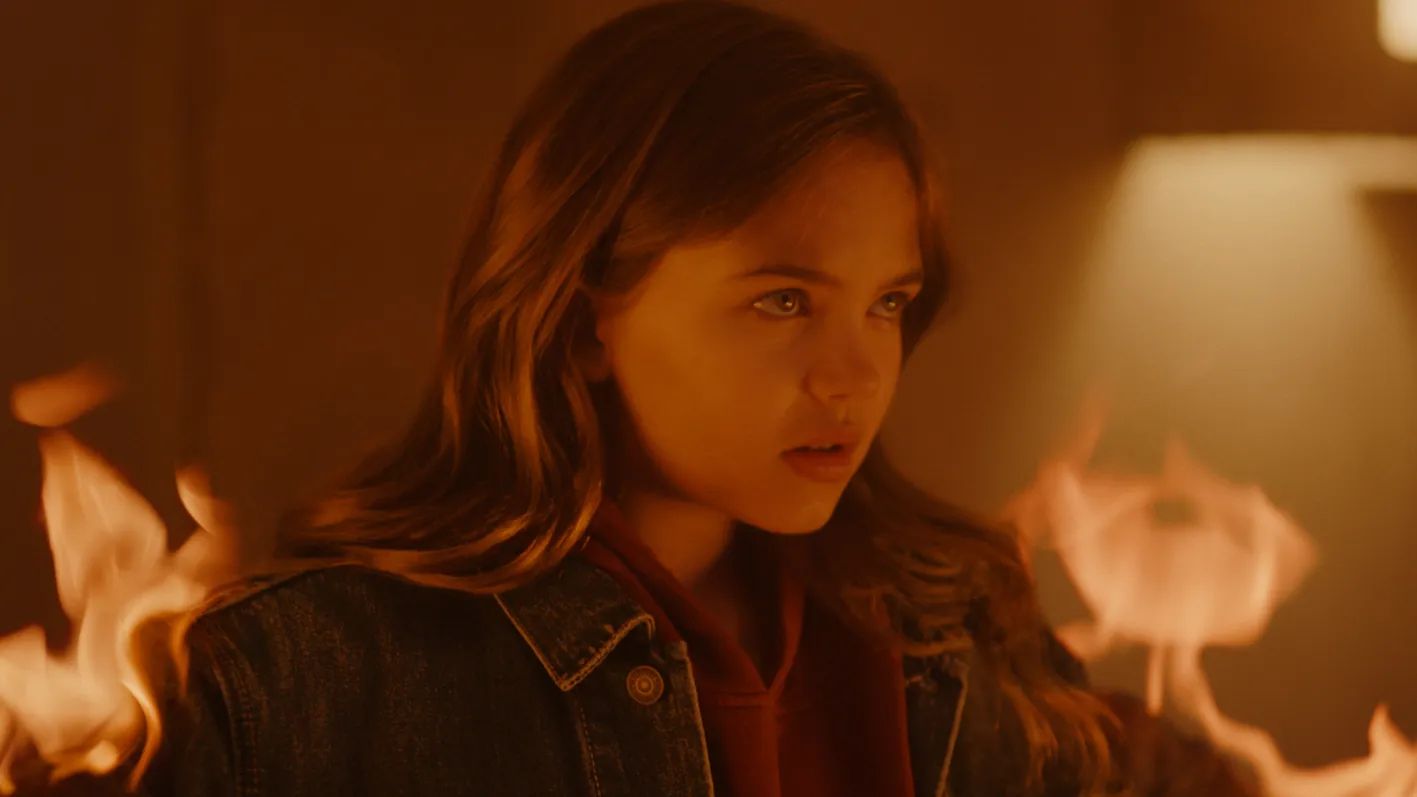 Firestarter is a strange beast with a difficult task: Retaining the core of the original story but not being to close too the orignal movie. Paying tribute to current political correctness, yet not changing the original material too much. For most of the time, they do fine, I’d say. Some changes did catch my eye: the conflict between the parents wasn’t there, as far as I remember, in the original movie. The mother wants Charlene to train so she can control her powers, the father would rather she suppress them, for who knows what may come out of them being released? In contrast, the original spent more time with Dad and daughter in the lab, the evil Rainbird slowly gaining Charlie’s confidence in order to kill her when appropriate. It went more for slow menacing tension – also the approach of King’s novel – while this plays more as a “fugitives-on-the-run” scenario.
Firestarter is a strange beast with a difficult task: Retaining the core of the original story but not being to close too the orignal movie. Paying tribute to current political correctness, yet not changing the original material too much. For most of the time, they do fine, I’d say. Some changes did catch my eye: the conflict between the parents wasn’t there, as far as I remember, in the original movie. The mother wants Charlene to train so she can control her powers, the father would rather she suppress them, for who knows what may come out of them being released? In contrast, the original spent more time with Dad and daughter in the lab, the evil Rainbird slowly gaining Charlie’s confidence in order to kill her when appropriate. It went more for slow menacing tension – also the approach of King’s novel – while this plays more as a “fugitives-on-the-run” scenario.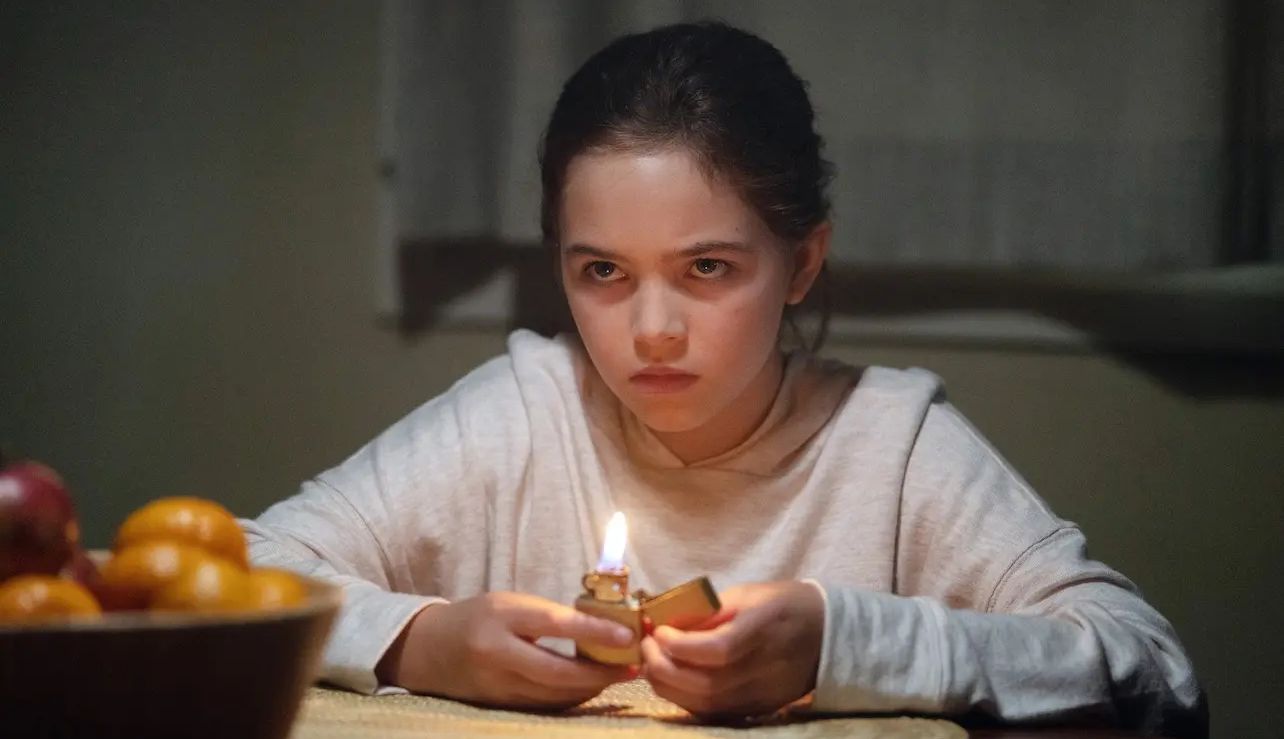
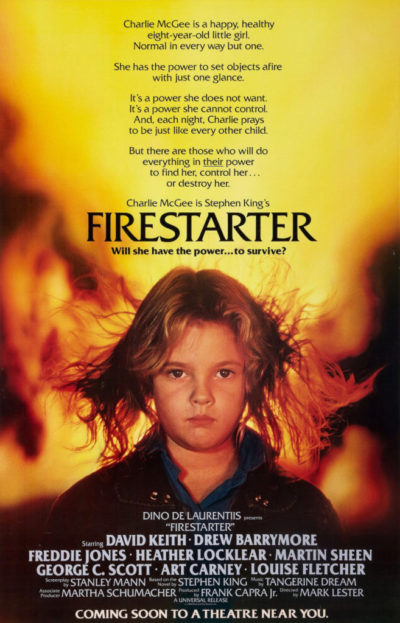 It’s somewhat ironic that John Carpenter was originally supposed to direct this. However, after The Thing tanked at the box-office, he was let go from the project, and replaced by the more commercially “safe” Lester. The irony being that The Thing is now regarded (rightfully) as one of the greatest scifi/horror films of all time, while this is… not. It’s very much a mid-tier Stephen King adaptation, far less well remembered than the similarly themed The Dead Zone, from around the same time. I can understand why: it’s lumbering when it needs to be taut, needlessly coming in a little shy of two hours, and only comes to life at the end, when a pissed-off Drew gets enough XP to learn her Level 3 Fireball spell.
It’s somewhat ironic that John Carpenter was originally supposed to direct this. However, after The Thing tanked at the box-office, he was let go from the project, and replaced by the more commercially “safe” Lester. The irony being that The Thing is now regarded (rightfully) as one of the greatest scifi/horror films of all time, while this is… not. It’s very much a mid-tier Stephen King adaptation, far less well remembered than the similarly themed The Dead Zone, from around the same time. I can understand why: it’s lumbering when it needs to be taut, needlessly coming in a little shy of two hours, and only comes to life at the end, when a pissed-off Drew gets enough XP to learn her Level 3 Fireball spell.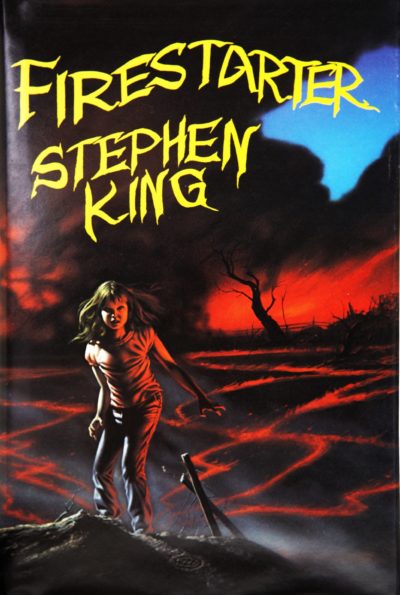 Having watched both versions of the film, I followed up by reading the book on which they were based. Despite my general fondness for horror, I haven’t read very much Stephen King: this is only the second novel of his, after Salem’s Lot. First thought: at 576 pages in the mass paperback edition, it’s quite a door-stopper, and you can see the problems in adapting a work of that size into a movie. Inevitably, a lot of the detail and nuance is going to be excised. There’s no doubt, the 1984 version is more faithful; the 2022 adaptation takes the basic concept of a young girl with pyrokinetic powers, on the run from the government with her father, and does its own thing, more or less.
Having watched both versions of the film, I followed up by reading the book on which they were based. Despite my general fondness for horror, I haven’t read very much Stephen King: this is only the second novel of his, after Salem’s Lot. First thought: at 576 pages in the mass paperback edition, it’s quite a door-stopper, and you can see the problems in adapting a work of that size into a movie. Inevitably, a lot of the detail and nuance is going to be excised. There’s no doubt, the 1984 version is more faithful; the 2022 adaptation takes the basic concept of a young girl with pyrokinetic powers, on the run from the government with her father, and does its own thing, more or less. Despite generally terrible reviews, this is definitely not, by any means, a terrible movie. It is, admittedly, a fairly generic sword-and-sorcery flick, in which a hero must rise from a common background to save the world from a terrible magical threat. But it looks spiffy – the hundred million dollar budget is on the screen. If the central performance has its issues, there’s enough around the fringes to make both for an adequately entertaining experience, and also merit the existence of a review here. In particular, the main antagonist is the evil witch Mother Malkin (Moore). She escapes from the prison to which she had been confined years ago by Gregory (Bridges), now the last survivor of his order of witch-hunters.
Despite generally terrible reviews, this is definitely not, by any means, a terrible movie. It is, admittedly, a fairly generic sword-and-sorcery flick, in which a hero must rise from a common background to save the world from a terrible magical threat. But it looks spiffy – the hundred million dollar budget is on the screen. If the central performance has its issues, there’s enough around the fringes to make both for an adequately entertaining experience, and also merit the existence of a review here. In particular, the main antagonist is the evil witch Mother Malkin (Moore). She escapes from the prison to which she had been confined years ago by Gregory (Bridges), now the last survivor of his order of witch-hunters. This is set in the everyday world – but with one major tweak. Witchcraft exists, and has been outlawed in the United States by the 11th amendment. Now, government agents from the BWI seek out witches, using tried and true methods from the middle ages (the “sink test” is exactly what it sounds like), and punish those found or suspected to be practicing witchcraft. But those opposed to this have set up an “underground railroad” to smuggle the targets over the boarder to Mexico. Teenage girl Claire (Adlon) is part of one such family, courtesy of her mom Martha (Elizabeth Mitchell); Dad is out of the picture. Claire is rather ambivalent about their activism, since she just wants to fit in at school. But the arrival of Fiona (Cowen) and her little sister, siblings whose mother was burned at the stake, forces Claire out of her professed neutrality,. Especially as the investigation of the unrelenting BWI Agent Hawthorne (Camargo) gets closer to home.
This is set in the everyday world – but with one major tweak. Witchcraft exists, and has been outlawed in the United States by the 11th amendment. Now, government agents from the BWI seek out witches, using tried and true methods from the middle ages (the “sink test” is exactly what it sounds like), and punish those found or suspected to be practicing witchcraft. But those opposed to this have set up an “underground railroad” to smuggle the targets over the boarder to Mexico. Teenage girl Claire (Adlon) is part of one such family, courtesy of her mom Martha (Elizabeth Mitchell); Dad is out of the picture. Claire is rather ambivalent about their activism, since she just wants to fit in at school. But the arrival of Fiona (Cowen) and her little sister, siblings whose mother was burned at the stake, forces Claire out of her professed neutrality,. Especially as the investigation of the unrelenting BWI Agent Hawthorne (Camargo) gets closer to home. Seeing this described as “an experimental thriller,” set my alarm bells ringing. I’ve seen enough “experimental” film in my time, to realize it’s typically a code-word meaning “incoherent rubbish.” The above rating is thus partially a reflection of my relief that this did not fall into that category. You still, very definitely, have to manage your expectations here. If you go in expecting a slick, Jason Bourne style adventure, you will be sorely disappointed. For this is a no-budget entity, largely guerilla filmed by a one-man crew, and with a lead actress who has no real experience. It has already significantly surpassed all my expectations, simply through not being a total disaster.
Seeing this described as “an experimental thriller,” set my alarm bells ringing. I’ve seen enough “experimental” film in my time, to realize it’s typically a code-word meaning “incoherent rubbish.” The above rating is thus partially a reflection of my relief that this did not fall into that category. You still, very definitely, have to manage your expectations here. If you go in expecting a slick, Jason Bourne style adventure, you will be sorely disappointed. For this is a no-budget entity, largely guerilla filmed by a one-man crew, and with a lead actress who has no real experience. It has already significantly surpassed all my expectations, simply through not being a total disaster. This is likely an admirable effort in terms of its budget. The IMDb estimates it costs $100,000 and it looks like Price squeezed every cent – or, since it’s British, penny – out of that. To give you some idea, also per the IMDb, “Sections of the film were shot during the Covid-19 United Kingdom lockdown with just the occupants of the director’s flat. The director’s girlfriend doubled for any actors and WhatsApp voice notes from cast members were used for any extra lines of dialogue.” This is the kind of thing that can only be respected. Which is why I feel a little bad about having to give this an underwhelming review, because… truth be told, it’s kinda boring.
This is likely an admirable effort in terms of its budget. The IMDb estimates it costs $100,000 and it looks like Price squeezed every cent – or, since it’s British, penny – out of that. To give you some idea, also per the IMDb, “Sections of the film were shot during the Covid-19 United Kingdom lockdown with just the occupants of the director’s flat. The director’s girlfriend doubled for any actors and WhatsApp voice notes from cast members were used for any extra lines of dialogue.” This is the kind of thing that can only be respected. Which is why I feel a little bad about having to give this an underwhelming review, because… truth be told, it’s kinda boring.